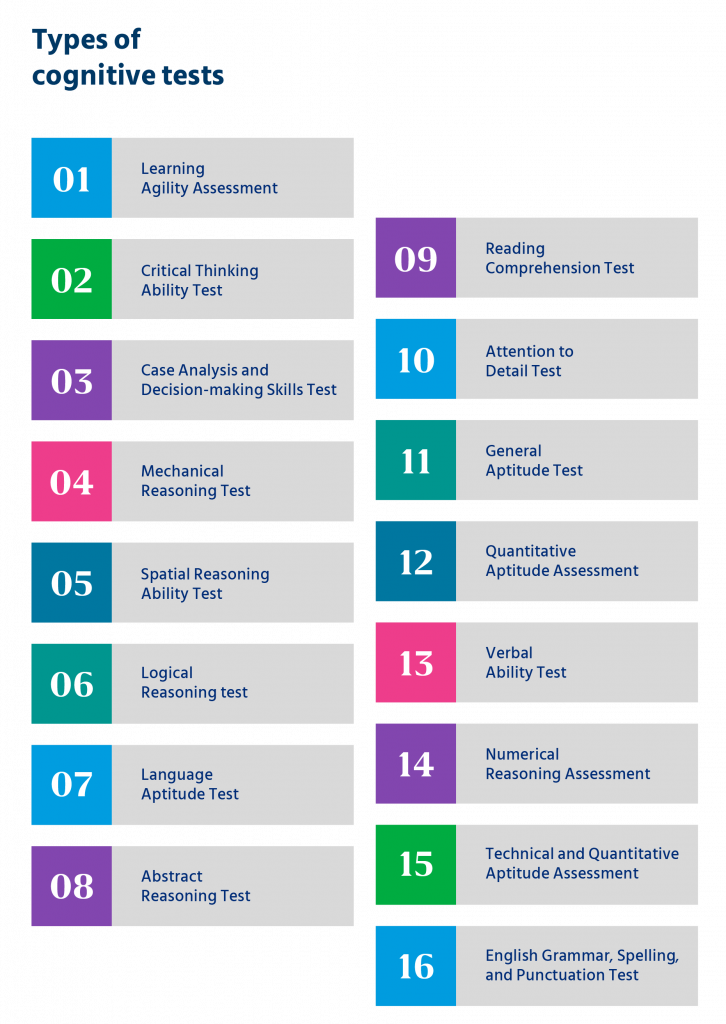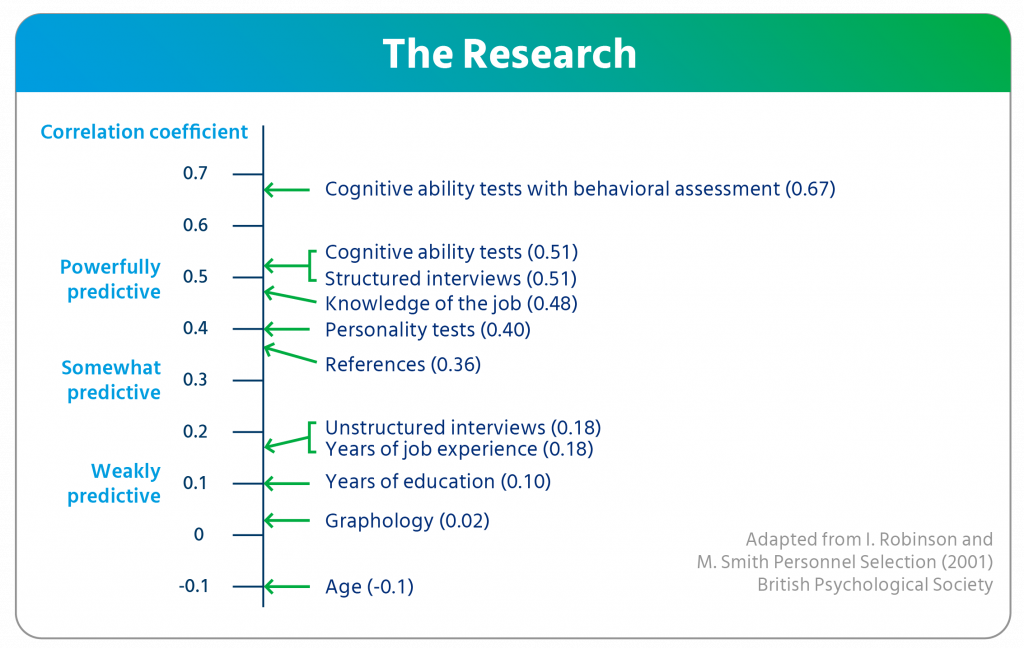The cognitive ability test checks for the essential competencies to perform any job efficiently. Such a test can assess a person’s mental construct regarding their ability to think quickly, solve ambiguous problems, and devise new concepts when presented with novel information. Some types of cognitive tests that assess candidates on various cognitive aspects and are commonly used in the recruitment process are:

Learning agility represents a candidate’s ability and willingness to learn from past experiences, adapt to a new situation, and efficiently perform in new work conditions. Undoubtedly, self-learners and high-potential employees are agile learners. They are fit for leadership positions; they actively respond to unfamiliar situations and maximize experiential learning. The Learning Agility Assessment is designed to find agile learners best suited for leadership positions in any organization.
It is helpful in:
- Creating a talent pool to identify high potentials (including emerging stars and early-career employees), making succession plans, strategizing key assignments, and also supporting their learning and development
- Making better recruiting decisions for roles that require learning agility
- Recognizing existing employees who are likely to perform well in international assignments
- Taking team building exercises up a notch.
The Critical Thinking Ability Test measures the decision-making capability of a candidate. The assessment evaluates whether a person can identify and address the problem, collate data to question assumptions, provide valid explanations, and offer solutions. Such tests aid in hiring at mid and senior managerial levels. These cognitive tests help recruiters identify and hire candidates who can recognize problems and solve them efficiently by critically analyzing the given information to identify assumptions, draw inferences and evaluate arguments.
It’s helpful in the selection of:
- Senior management candidates
- Mid-management candidates
- Business consultants
- Critical decision-makers and strategists
This test is primarily used as a screening tool to select management graduates from the vast talent pool. Such tests are available as case study simulators to understand a candidate’s analytical approach and problem-solving skills accurately. The test analyzes and grades candidates on their answers, thus generating their performance reports. The report is readily available for reference in successive interview rounds, allowing further discussion and analysis with the candidate. The test includes a case study question the candidate must solve and finish in time.
The Mechanical Reasoning Test measures the person’s ability to solve complex problems based on the knowledge, comprehension, and application of mechanical concepts. The assessment evaluates a candidate’s command of fundamental physical laws and mechanical operations and a knack for learning automated processes, including understanding mechanical setups and more. Such an assessment can offer questions of varying difficulty levels in English. The questions are interactively structured to map a candidate’s ability to solve engineering tasks, decode technical drawings, and understand technical devices and their functions. The test helps measure a candidate’s inclination to interpret and apply mechanical principles for various engineering and technical job roles.
It’s helpful in hiring candidates with past work experience, preferably in aircraft mechanics, maintenance and repair, automotive, etc.
The Spatial Reasoning Test is a cognitive test that evaluates a candidate’s ability to understand and establish spatial relations among objects. This test assesses a person’s ability to visualize and manipulate complex shapes, patterns, or designs in a two-dimensional or three-dimensional plane. Identifying the top candidates through spatial reasoning can reduce downtime in the hiring process. The candidates who have fared remarkably well in the test are considered intelligent analysts and natural problem solvers in conceptual skills-based jobs.
Such tests measure a candidate’s propensity to visualize patterns and shapes in complex puzzles and produce the desired results. The test includes questions based on rotating shapes, matching shapes, merging shapes, viewing cubes in 3D, and manipulating other types of solid forms in 2-D and 3-D.
It’s helpful in:
Assessing candidates for screening and placement in sectors that require exposure in specific areas- design, architecture, publishing, illustration, and technology. The test is helpful in the careful selection of candidates for technical and craft-centric jobs.
This Logical Reasoning Test evaluates a person’s ability to analyze data from multiple viewpoints by breaking it down into simple components, structuring the information logically, and analyzing the relationship between different data points to arrive at a solution. This cognitive assessment checks for a candidate’s ability to analyze the clarity of thoughts while skipping irrelevant aspects in the process. Those candidates with solid reasoning skills are good at reaching the correct conclusion. They use a steady and consistent approach to solve problems and structure problems and situations accordingly. These assessments identify talented individuals through questions that challenge their logical reasoning skills.
It’s helpful in:
Hiring fresher candidates across all education levels for various roles, from team lead and managerial positions to executive-level functions.
This cognitive test helps identify if candidates have the aptitude to learn foreign languages. The Language Aptitude Test aims to evaluate candidates on linguistic aspects of learning. The test measures the person’s ability to acquire communication skills, mainly speaking and listening skills. It gives an accurate idea about the skill sets of the candidate taking the test, especially in areas such as number learning, linking speech sounds and phonetic symbols together, word formation, spelling, and vocabulary.
It’s useful for:
- Organizations providing foreign language services, for example, translation services
- Education and training institutes measuring candidate’s aptitude for acquiring new languages
- BPOs and KPOs hiring top individuals who can communicate with clients in foreign countries.
The test measures a candidate’s lateral thinking abilities that help define logical rules, trends, and patterns to present the most appropriate solutions for solving problems. Those candidates who possess strong abstract reasoning skills can solve complex problems creatively. They can apply learnings to solve novel problems by connecting different information points to grasp the bigger picture, detecting patterns and relationships, and solving complex problems by developing innovative solutions. Such tests can effectively test candidates’ problem-solving aptitude through logic and creative thinking.
It’s helpful in:
Hiring candidates worldwide for various industry job roles, mainly suited for entry-level or senior-most positions. The test assesses people for sales and marketing roles, creative designing, writing, and analytics.
The test evaluates candidates’ ability to read, process, retain and synthesize a large amount of written information and quickly comprehend large pieces of written texts.
Candidates who perform exceedingly well in these tests are likely to absorb information faster, interpret it more correctly, and implement it in making rational business decisions than others. The test consists of questions, including a passage meant to be comprehended by the candidate, after which the candidate will have to answer questions related to the passage. The format of questions can either be direct or inferential.
It’s helpful in:
Hiring fresher candidates with work experience of 0-1 year for various job roles across industries.
The Attention to Detail Test is beneficial for finding employees who can demonstrate thoroughness and accuracy in accomplishing a task and capturing every minute detail, anywhere, at any point, ensuring quality and timelines for completing work. Highly focused individuals can achieve quality-focused results faster and better than others because they do not need to be continually micromanaged. This test will help organizations filter the top candidates that provide high-quality, detail-oriented, and on-time results. In addition, recruiters can use this test to hire for entry-level administrative and clerical jobs. This speed-based test measures candidates using various comparison-based questions based on numbers, texts, images, and visuals.
It’s useful for organizations seeking effective screening and recruiting entry-level professionals for various industry roles. It is, however, most suitable for data processing and administrative tasks
General Aptitude Test
Organizations need candidates who can solve complex problems through logical thinking. This test helps companies assess individuals to find people with the innate or acquired ability to learn new things and apply logic to solve complex problems. The General Aptitude Test evaluates candidates on core skills and competencies, which are essential to perform well on the delegated tasks. This test measures the person’s tendency to perform well across various functions and helps managers identify skill gaps and training needs.
The test is thoughtfully designed to assess candidates for various skills with a wide variety of questions. It measures the individual’s information-processing ability besides evaluating their problem-solving skills at work. Finding potential hires through these tests can significantly improve organizational productivity. An effective employee knows what is expected of them.
It’s helpful in the hiring for:
- Administrative and clerical roles
- Executive roles
- Functional and supervisory roles
- Senior managerial and business head roles
- Leadership and strategic roles
The Quantitative Aptitude Test measures whether a candidate is good at perceiving and processing numbers and related functions to perform basic arithmetic operations while maintaining accuracy and speed in calculations. This test accurately measures the aptitude for numerical analysis. It evaluates a candidate’s skills in performing numerical operations, which apply to candidates across job roles, regardless of their educational experience.
It is helpful in:
Screening and hiring of candidates with 0-2 years of work experience. The test is best suited for candidates with an educational background in engineering, a bachelor’s or master’s in business administration, certification courses in statistics, etc.
Candidates with strong verbal abilities can express their ideas and thoughts using correct sentence structure, proper words, and grammar. Such candidates can communicate well and understand messages in business contexts. The Verbal Aptitude Test helps hire candidates with a good command of English and the ability to understand, comprehend, and convey written messages precisely and clearly by formulating grammatically correct sentences.
It is helpful in:
Finding candidates for different job roles across industries with 0-1 years of work experience.
Candidates with strong numerical reasoning can analyze statistical data to draw inferences and make suitable business decisions. Since deriving information from numerical data is essential for the business, every company needs professionals who can collect, study, understand, and crunch data to make things easier for organizations. This basic-level test is designed to measure a candidate’s ability to work with the information presented in a number-based format to make essential business decisions and analyze its impact on how good a commercial decision is.
It is helpful in:
Finding candidates for different job roles across industries with 0-1 years of work experience, mainly in data analysis, banking operations, and accounting and financial analysis.
Most organizations need help finding talented software engineers, given the talent scarcity. However, in software development, a professional needs to be more thorough in understanding all areas of software development, from designing to testing. Generally, software engineers are well-versed in any given programming language and are conceptually sound. Such tests determine if a candidate follows a structured approach when solving problems. Most importantly, employers can measure candidates’ essential competencies to ensure that only deserving candidates make it to the final interview round.
It’s helpful in:
Hiring candidates with an engineering background, preferably in IT, with 0-2 years of work experience. The test helps recruiters screen and select candidates from tier-I and tier-II colleges.
Given the fast-paced corporate world, communication is at the core of every business. As a result, gaining fluency in oral and written communication has become a norm for professional behaviour. Such cognitive tests evaluate basic principles of grammar and spelling and assess candidates’ knowledge in parts of speech, common words and abbreviations, punctuation, etc. This test measures a candidate’s proficiency in English for many different professional roles.
It is helpful in:
Finding and hiring candidates proficient in English, mainly for such job profiles as sales, marketing, technical support, and more roles.









 Behavioral Competencies
Behavioral Competencies Cognitive Competencies
Cognitive Competencies Coding Competencies
Coding Competencies Domain Competencies
Domain Competencies

























